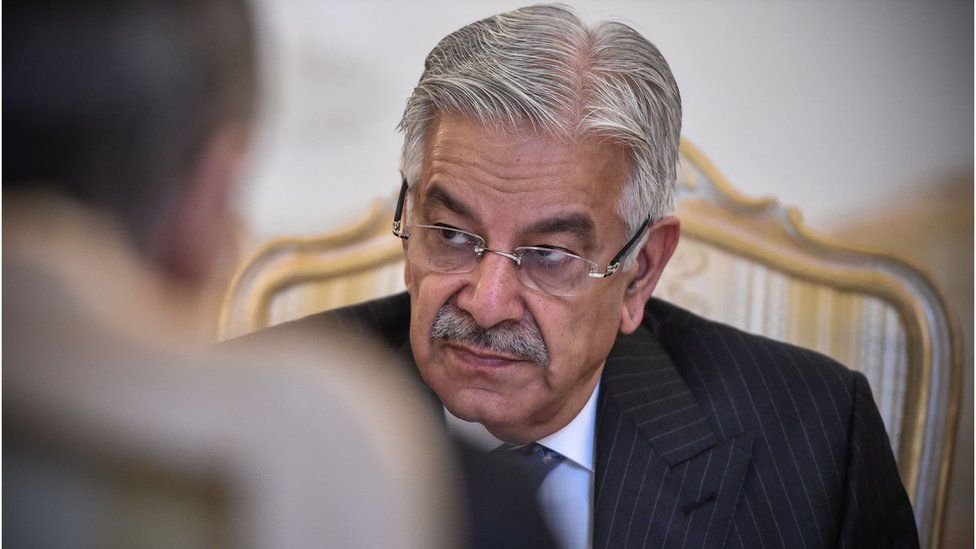Khawaja Asif, the defence minister of Pakistan, certainly wasn’t prepared for the intensity of the anger that would occur after he spoke in parliament last week and called female PTI opposition leaders “trash and leftovers” of party leader Imran Khan.
After all, similar sexist statements have been made by Pakistani authors, cricket players, celebrities, and judges. Men have a permission to get away with sexism, as provincial assembly member Sharmila Faruqi stated to the local media.
Additionally, Mr. Asif had previously made similar remarks in parliament. The 73-year-old made a harsh allusion to Sheerin Mazari’s size by calling her a ‘trailer trolley’ in a previous joint session.
Such terminology had been employed in the legislation many times before. The PTI and the PML-N, both led by Mr. Asif, have routinely made discriminatory and misogynistic comments about female lawmakers from other parties.
But this time, there was a strong and widespread uproar against Mr. Asif.
On social media, lawmakers from the PTI and other parties attacked him, and he received harsh criticism for his remarks from numerous media sources. The biggest English-language newspaper in the nation, Dawn, published an editorial in which it was stated that Khawaja Asif, our defence minister, “needs schooling on gender equality.”
Later, Mr. Asif claimed on Twitter that his remarks had been “taken out of context” and that “calling someone ‘trash’ or ‘leftover’ is not gender-specific.” He did not, however, apologise.
However, according to sociologist Nida Kirmani, this was a sign of change.
She claims that if the outcry had not occurred a few years earlier, he wouldn’t have been forced to respond or provide an explanation. The latest backlash to Khawaja Asif’s discriminatory remarks is the result of a protracted battle by women’s rights advocates.
She claims that social media has fundamentally changed the game by giving women a platform to speak out.
And that may also be seen in discussions taking place far from the centre of attention. Recently, a scene from the well-liked on-going drama Baby Baji in which a husband spanks his wife was shared online with several males praising the moment for “finally putting the woman in her place.”
However, females reacted angrily right away.
They included Amina Rehman, who observed: “I saw a number of violent husbands in my community enjoy it with their mistreated women. People exult when the slap finally occurs because of the misguided belief that women are the source of all evil.
Many Pakistani women think that this is due in part to popular entertainment’s frequent use of regressive depictions of women. Sabahat Zakariya, a video blogger, bemoans the fact that plays on TV or streaming services have become more sexist over time. She recalls TV programmes from the 1980s, which were much more progressive and portrayed women who had both work and families.
A fictional, subversive story about female detectives called Churails is one example of a show that has attempted to disrupt this stereotype. But following an outcry, Pakistan’s censors decided it was too audacious and banned it.
Actor and campaigner Adeel Afzal laments that “Pakistani society has not accepted a woman as an individual, a human, or to give her the right to live the way she deserves.”
And every crude thing we read, watch, or hear is based on this idea. Because of this, whenever a woman complains about being mistreated, abused, or harassed, we fight and intervene, and the offender flees.
But occasionally the clamour is loud enough to compel a discussion.
Nabil Gobol of the Pakistan People’s Party caused a stir in April with some of his podcast comments. He stated, in reference to political agreements, “There is an English proverb that says that if rape is inevitable, you might as well enjoy it.”
Many others expressed their displeasure on Facebook and Twitter, tagging Mr. Gobol’s party leader and requesting that something be done. He was eventually asked to apologise by the group. So he did.
According to Ms. Kirmani, “with consistent criticism, politicians and people would stop themselves before saying anything offensive against women.” Hopefully, this day will materialise at some point.

